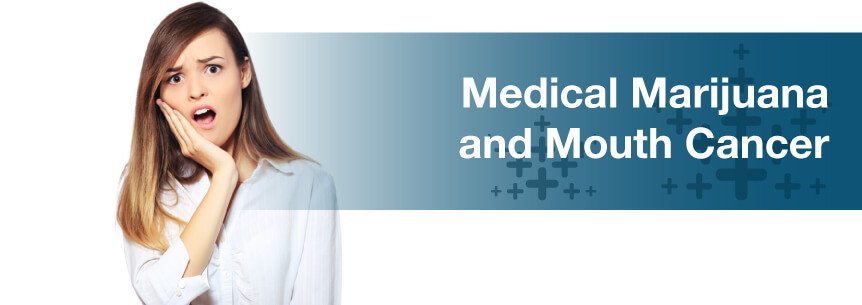
With the proliferation of legal marijuana underway in multiple U.S. states, its potential for medical use is making a lot of waves these days. Medical marijuana for mouth cancer is another proven pairing that researchers are now studying in greater detail to better understand its benefits for cancer patients.
There are still questions about whether smoking cannabis causes mouth cancer or not, since medical research into marijuana use is still evolving.
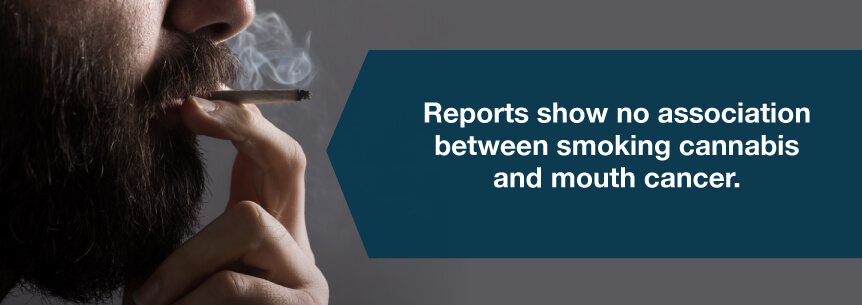
A pro-legalization lobbying group, NORML, along with various established doctors, dentists and scientists, report no association between smoking cannabis and mouth cancer. You should still carefully consider whether medical cannabis for mouth cancer is something you wish to pursue. And if you decide to choose it, know that other consumption methods are available to you, which we’ll describe below, other than smoking cannabis.
Find A Doctor Find A Dispensary
Hundreds of medical and scientific research studies across the globe confirm that cannabis can kill cancerous cells — even those that are traditionally resistant to cancer treatments, such as mouth cancer. However, a U.S.-based research study shows cannabinoids in marijuana could be the key to treating oral cancer cells.
THC is the primary cannabinoid found in marijuana and contains many of the plant’s medicinal benefits. A 2010 study entitled “Cannabinoids inhibit cellular respiration of human oral cancer cells” explored how this cannabinoid works on cancer cells. These researchers found several main benefits of THC:
The results of this study prove marijuana-based medications could be used to treat even the most resilient forms of cancer. This alone is evidence the U.S. government should rethink the classification of marijuana, at least to allow further medically-based research.
Scientists and researchers, through various studies, have found medical weed effective for treating these cancer symptoms:
Nabilone and dronabinol — two cannabinoids — are FDA-approved for preventing and treating chemo-related nausea and vomiting. But the therapeutic potential of cannabis goes even further to extend way beyond relieving pain and nausea. Researchers now believe medical pot leaves healthy cells alone while inducing cancer cell “suicide.”
Presently, the most accepted and widespread use of marijuana for mouth cancer is as an “antiemetic.” Patients with cancer who receive radiation therapy or chemotherapy experience extreme nausea and vomiting often as side effects. Medical marijuana helps treat their nausea and vomiting as well as the pain these cancer treatments cause.
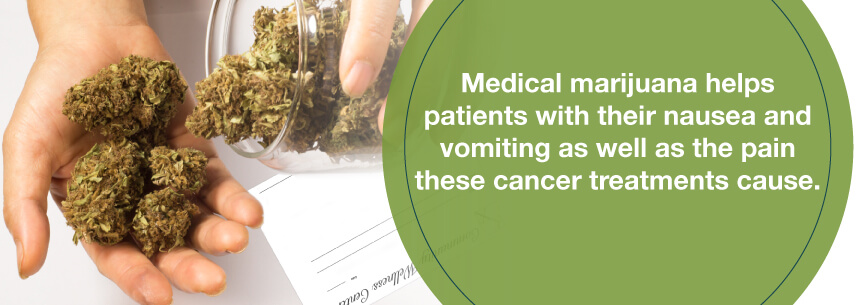
Some potentially helpful cannabis strains for mouth cancer include:
Not only do these strains help with pain, nausea and vomiting, but they may also help with insomnia, depression, anxiety and more.
As medical cannabis continues to grow in popularity, the methods of delivery continue to evolve too. These delivery methods provide patients with an easy way to receive the therapeutic potential of marijuana and mouth cancer treatment.
While many associate marijuana with smoking, be it joints, blunts, bongs or pipes, smoking isn’t the healthiest option out there, especially for those who have mouth cancer. When you inhale pot smoke, most of the cannabinoids enter your body through your lungs and then go into your bloodstream. This direct exchange provides you with the quickest effects versus other methods of delivery.
As mentioned, however, it’s not a healthy way to receive your cannabis for mouth cancer treatment. Instead, you may want to try other methods to obtain your cannabis and mouth cancer treatment, such as:
Gaining information and knowledge is just the first step in the medical cannabis process. You will need to find a medical marijuana doctor who will give you a recommendation and “qualify” you to use medical marijuana for mouth cancer. Visit MarijuanaDoctors.com to search for a cannabis dispensary or medical marijuana doctor to help you find relief from your debilitating mouth cancer symptoms.
Find A Doctor Find A Dispensary
Mouth cancer is where you have cancer inside your mouth or on any of the components making up your oral cavity. It can occur in places such as the:
Doctors sometimes refer to mouth cancer as “oral cavity cancer” or “oral cancer.” Doctors treat mouth cancer the same they would neck and head cancer.
There are two categories within the oral cancer classification:
Oropharyngeal and oral cavity cancers together make up around 2.9 percent of all cancers in the U.S., according to the American Dental Association.
Some specific types of mouth cancer may include the following:
Your mouth and throat are normally lined with squamous cells. Squamous cell carcinoma occurs when these cells become abnormal. Over 90 percent of oropharyngeal and oral cavity cancers are squamous cell carcinomas, reports Cancer Treatment Centers of America.
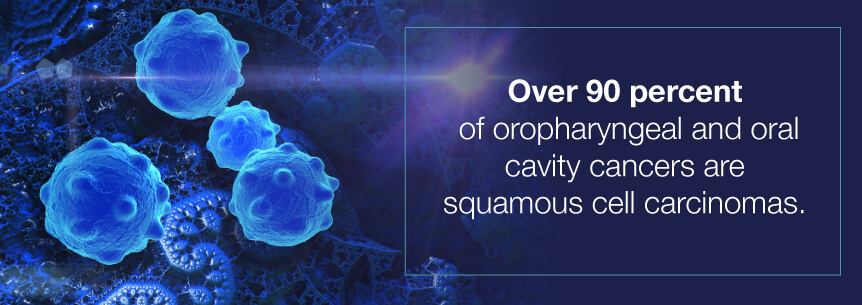
Verrucous carcinomas represent around five percent of all mouth cancers. It’s a slow-growing type of cancer made of squamous cells. It doesn’t usually spread to other areas of your body — however, it could still invade the surrounding tissue in the area of origin.
Mouth cancers developed in your lymph tissue are known as lymphomas. The base of your tongue and your tonsils contain lymphatic tissue.
Various tumor-like conditions and non-cancerous tumors can develop in your oropharynx and oral cavity. These, on rare occasions, can develop into cancer. Because of this, surgeons usually remove benign tumors surgically. Benign lesions may include:

In earlier times, when dentists or doctors found a lesion in the mouth of a patient, they would propose a painful biopsy, according to the National Institutes of Health. Patients would have a long waiting period for their lab results to tell them if the lesion was cancerous or not. Alternately, doctors would keep an eye on the lesion with follow-up appointments to monitor it every few months and check for changes pointing towards cancer.
Back then, doctors didn’t have the right chair-side equipment to take a look at the lesions during their early development and decide if they needed a biopsy. Doctors didn’t have much knowledge as far as specific causes of mouth cancer. Except for alcohol and tobacco use being known risk factors, doctors didn’t know if mouth cancer was a genetic or viral disease.
By the time of actual diagnosis, most mouth cancers were already in their advanced stages. Treatment typically included radiation to shrink the tumor and then neck and head surgery to remove it. The surgery caused disfigurement in some cases.
As education and public awareness about mouth cancers has increased, we’ve seen improvements in early detection as well as treatment. For the last fifty years, refinements in surgical procedures and radiation therapy, in addition to adding chemotherapy to the oral cancer treatment mix, have been beneficial in battling the spread of mouth cancer to other areas of the body. As more improvements in the tools used for detecting precancerous mouth lesions become available, fewer people will die from the disease.
Common symptoms of mouth cancer may include:
If you experience any of the symptoms above, give your doctor a call right away.
Mouth cancer occurs all over the world with a high incidence of morbidity and mortality. It has an association with low survival rates and poor prognoses. Some patients with mouth cancer find the recovery time challenging, as well. Some oral cancer patients have difficulties with eating, drinking, breathing and swallowing, which can result in nutritional deficiencies. The cancer could affect speech and the surgery can cause facial disfigurement.
If you have radiotherapy done, it could cause xerostomia (dry mouth) and affect your taste buds. While surgery involving your mouth, throat, lips, jaw or tongue can change your looks, reconstructive surgery and modern surgical approaches are better these days at producing less scarring.
And while mouth cancer manifests with the above physical symptoms and effects, it also can have mental effects.
Coping with a mouth cancer diagnosis can be difficult, both emotionally and practically. You’ll likely feel frightened, upset and confused at first — perhaps feeling as though things are out of your control. These things can cause other issues, too, including depression. You may find it hard to communicate with others. You may have low self-esteem and might isolate yourself socially, all of which can impact your relationships. This is the time where you’ll want to get as much information and support as you can.
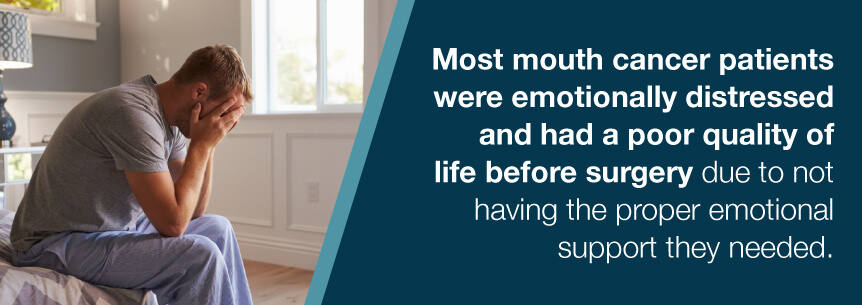
In a study with 206 patients published in the Journal of Clinical & Diagnostic Research, most mouth cancer patients were emotionally distressed and had a poor quality of life before surgery due to not having the proper emotional support they needed. Conclusions of the study show addressing the psychological needs of patients with mouth cancer are essential and that doctors should include psychological counseling in the patient’s thorough treatment plan.
Since cancer diagnosis can impact patients and their families (or caregivers) significantly, feelings of anxiety, depression and fear aren’t uncommon at all, as the American Cancer Society notes.
Facts about mouth cancer reported by the Oral Cancer Foundation in November 2017 include:
Mouth cancer treatment depends on the stage and location of your cancer, your personal preferences and your overall health. Your doctor may prescribe one type of treatment or a combination of cancer treatments. Some mouth cancer treatments may include:
The surgeon may perform any of these types of surgery:
Surgery does come with some risks, of course, including:
You might require a tube to help with eating, drinking or taking your medication. The tube is for temporary use and your doctor inserts it into your stomach through your nose. If you require it for a longer period, the doctor will insert the tube into your stomach through your skin. In some instances, a breathing tube may be necessary but is usually temporary.
With radiation therapy, the doctor uses high-energy proton or x-ray beams to kill the cancer cells. If you’re in your early stages of mouth cancer, you may only require radiation therapy and no other treatment. In some cases, the surgeon will use radiation therapy after surgery or combine it with chemotherapy.
Side effects of radiation therapy for mouth cancer might include:
Chemotherapy uses medications to kill the cancer cells. Sometimes, the doctor will combine chemo with radiation therapy to increase the radiation therapy’s effectiveness. The side effects of chemotherapy usually depend on the medication you receive. However, common side effects typically include hair loss, nausea and vomiting.
With this therapy, targeted drugs alter certain aspects of the cancer cells and impact their growth. One particular approved targeted therapy drug for treating neck and head cancers is Cetuximab (Erbitux). Your doctor may combine targeted therapy drugs with radiation therapy or chemotherapy.


Please allow us to access your location to find local dispensaries.
VIEW ALL DISPENSARIES ➔